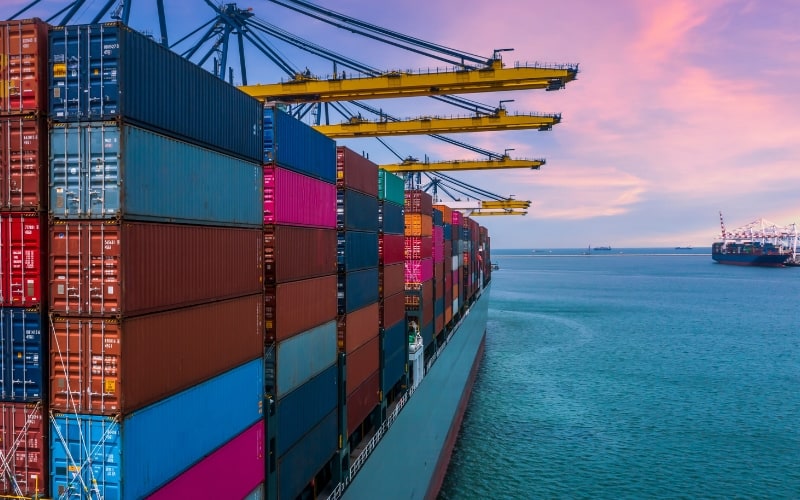Moving from the UK to New Zealand involves a comprehensive process that requires several key steps. The process starts by preparing your belongings for shipping – which involves hiring a reputable international moving company to handle the logistics – and familiarising yourself with the customs regulations. Understanding customs regulations is a key part of ensuring a smooth transition, especially as New Zealand has strict import requirements that must be adhered to.
It’s important to understand these regulations, including prohibited items and duty charges, as getting things wrong can prevent delays and complications upon arrival. New Zealand’s stringent biosecurity measures are aimed at protecting the country’s unique flora and fauna from invasive species, but they can be complex to understand if you are doing so for the first time.
Much like when you are navigating Australian customs, you need to comply with New Zealand’s customs regulations and biosecurity protocols to ensure a seamless transition to your new life in New Zealand.
Fortunately, when you appoint a company like United International Removals, your Move Manager will ensure you are properly prepared and our expert customs agents will take care of everything for you in New Zealand.
The New Zealand Customs Process
For UK expats moving to New Zealand, navigating the customs process is a key step in your relocation journey. The process typically begins before departure, with you having to complete a Passenger Arrival Card, providing details about your travel itinerary, personal belongings and any items that you are bringing into the country.
Upon arrival in New Zealand, expats must declare all goods they are bringing with them, including household items, vehicles and personal effects. Customs officials may conduct inspections to ensure that you are complying with import regulations and biosecurity requirements.
Depending on how many belongings you have and the complexity of the shipment, the customs clearance process can vary in duration. Generally, it takes a few days to several weeks for shipments to be cleared and delivered to the intended destination.
Required Forms and Documentation
You will need to complete a Passenger Arrival Card before you land in New Zealand, which provides details about your travel itinerary and personal belongings. This form is typically provided on the flight or upon arrival in New Zealand. You might also need to complete a Customs Declaration form, declaring any goods that you are bringing into the country. These forms can be obtained from your removal company, which will also provide guidance on how to fill them out correctly to avoid delays. This is something that United International Removals can help you with.
It’s crucial to ensure that all information is accurate and complete to comply with customs regulations and facilitate the clearance process efficiently. Otherwise, you could be faced with lengthy delays. You should be prepared to provide supporting documentation—such as inventory lists, purchase receipts, and vehicle registration documents—as requested by customs officials.
Shipping Your Belongings to New Zealand

Moving from the UK to New Zealand is an exciting adventure, one that’s filled with new opportunities and experiences. However, the process of relocating your belongings across the globe can be daunting without proper planning and assistance.
Choosing an International Removal Company
Choosing the right international removal company is a key first step in the moving process. When evaluating potential removal companies, consider factors such as experience, reputation and reliability. Look for companies with extensive experience in New Zealand relocations and positive reviews from past customers.
Additionally, inquire about the range of services offered, including packing, shipping and customs clearance assistance. Don’t hesitate to ask questions about insurance coverage, transit times and communication channels to ensure a seamless moving experience from start to finish.
Packing Tips for Safety and Security
Proper packing is essential if you want to keep your belongings safe during transit.
- Start by decluttering and organising your possessions, taking inventory of items that will be shipped and disposing of or donating any unnecessary items.
- Invest in high quality packing materials – including sturdy boxes, bubble wrap, packing tape and protective padding – to prevent damage during transit.
- Pack items strategically, placing heavier items at the bottom of boxes and fragile items in the centre surrounded by cushioning materials.
- Label each box clearly with its contents and destination room to facilitate unpacking upon arrival.
Possible Customs Fees and Charges
It’s important to be aware of potential customs fees and charges associated with shipping your belongings to New Zealand. Depending on the value and nature of your items, you may be required to pay import duties, taxes or other fees upon entry into the country. These fees can vary depending on the items being imported and their declared value.
Whilst most people moving permanently to New Zealand do not have to pay customs duties or taxes, they will likely need to pay other costs, such as inspection fees.
United International Removals can provide guidance on estimated customs fees and charges based on what you’re shipping, helping you to budget for any additional expenses.
- Goods and Services Tax (GST) – In New Zealand, most goods imported for personal use are subject to GST of 15%. This tax is applied to the total value of the goods, including the cost of the item, freight, and insurance.
- Customs Duty – Certain items may be subject to customs duties, which are taxes imposed on specific imported goods. The rate of customs duty varies depending on the type of goods and their country of origin.
- Excise Duty – Excise duty may apply to certain goods such as alcohol, tobacco, and petroleum products. These duties are calculated based on the quantity or volume of the goods being imported.
- Import Entry Transaction Fee (IETF) – An Import Entry Transaction Fee may be charged for processing customs declarations and entry documentation for imported goods. The fee is typically a flat rate per import entry.
- Biosecurity System Entry Levy – In addition to customs duties and taxes, you may be required to pay a Biosecurity System Entry Levy on certain imported goods to help fund New Zealand’s biosecurity measures.
Restricted or Prohibited Items
New Zealand’s biosecurity measures are among the most stringent in the world, aimed at protecting the country’s unique environment and agriculture from invasive pests and diseases. This means that there are several items that you cannot bring into New Zealand under any circumstances. These include:
- Fresh fruits and Vegetables
- Meat and Dairy Products
- Seeds and Plants
- Live Animals
- Items made from endangered species.
- Items such as firearms, illicit drugs, and objectionable material are strictly prohibited.
Some items may require special permits or conditions for importation into New Zealand, including:
- Firearms
- Ammunition
- Prescription Medication
- Certain Agricultural Products
In some cases, you may need to obtain a permit from the relevant government agencies, provide documentation, or meet specific requirements to bring these items into the country legally.
Attempting to import banned or restricted items into New Zealand can result in severe penalties, including fines, confiscation of goods and prosecution. Customs officials conduct thorough inspections of incoming shipments and luggage to detect and confiscate prohibited items.
New Zealand’s Biosecurity Measures

New Zealand’s strict biosecurity laws are in place to safeguard the country’s unique environment, agriculture and economy from the threat of invasive pests and diseases. As an isolated island nation with a fragile ecosystem, New Zealand is particularly vulnerable to the introduction of foreign organisms that could wreak havoc on native flora and fauna, agricultural crops and livestock. The introduction of invasive species has the potential to devastate ecosystems, disrupt food chains and cause irreparable damage to the environment.
Invasive pests and diseases can also pose significant risks to New Zealand’s agricultural industry, which plays a vital role in the country’s economy and exports. As such, biosecurity measures are an essential part of protecting New Zealand’s natural heritage, biodiversity and economic prosperity for future generations.
Items That Pose a Significant Risk to Biosecurity
Certain items pose a significant risk to New Zealand’s biosecurity and are subject to strict regulations or outright bans on importation. These include fresh fruits and vegetables, meat and dairy products, seeds and plants and live animals. These items have the potential to harbour pests, diseases or pathogens that could pose a threat to the environment and agriculture if introduced.
Additionally, some foods, plants, and animal products may carry diseases or parasites that are not present in New Zealand and could spread rapidly if introduced. By restricting the importation of these items and enforcing strict biosecurity protocols, New Zealand aims to minimise the risk of invasive species and protect the country’s natural and agricultural resources.
Biosecurity Measures for Travellers and Luggage
New Zealand’s biosecurity measures extend to travellers and their belongings. You are required to declare any food, plant or animal products that you are carrying upon arrival in New Zealand. You will also need to undergo biosecurity inspections to prevent the introduction of prohibited items. Customs officials conduct thorough inspections of luggage, footwear and personal effects to detect and confiscate any items that pose a biosecurity risk.
Arriving in New Zealand With Personal Luggage
New Zealand customs is not reserved solely for large shipments of personal belongings, and it’s something that you will be faced with when you arrive in New Zealand, as you are likely to have a small amount of personal luggage with you. This will also be subject to the country’s strict customs restrictions and measures.

Declaring Items at the Airport
Upon arrival in New Zealand, all travellers are required to complete a Passenger Arrival Card, providing details about their travel itinerary, personal belongings and any items they are bringing into the country. It’s important to be honest and accurate when completing this form and to declare any items that may be subject to customs regulations or restrictions.
This includes items such as food, plants, animal products, medications and goods purchased overseas. Declaring items at the airport allows customs officials to assess any potential biosecurity risks and ensure compliance with import regulations, protecting New Zealand’s environment, agriculture and public health.
Tips for Packing Your Luggage to Make the Customs Process Smoother
To speed up the customs process and avoid delays upon arrival in New Zealand, it’s important to pack your luggage thoughtfully.
- Start by familiarising yourself with New Zealand’s biosecurity regulations and restrictions to determine which items need to be declared and any specific packaging requirements.
- Pack items in sturdy, sealed containers to prevent spillage or contamination during transit and ensure that all food items are commercially packaged and labelled with ingredients and expiration dates.
- Avoid packing items such as fresh fruits and vegetables, meat and dairy products, and plant materials, as these are generally prohibited or subject to strict import regulations.
What to Expect When Arriving in New Zealand with Personal Luggage
Upon arrival in New Zealand, you will proceed through customs and immigration checkpoints, where you will be asked to present their passport, visa and completed Passenger Arrival Card. Customs officials may conduct inspections of luggage and belongings to verify declarations and assess any potential biosecurity risks.
Be prepared to answer questions about the contents of your luggage and provide documentation or receipts for any declared items. While the customs process may vary depending on the volume of travellers and the time of arrival, remaining patient and cooperative with customs officials will help facilitate an efficient entry into the country.
Preparing for Your Move to New Zealand from the UK

The success of your move from the UK to New Zealand relies on planning, adherence to customs and biosecurity regulations, and having a proactive approach. Understanding the customs process and being mindful of the associated fees and regulations is key if you want to avoid unnecessary complications and ensure a seamless transition from start to finish.
Navigating New Zealand’s customs procedures may seem daunting, but with the support of a reputable removals company, you can relax knowing that you’re in capable hands. At United International Removals, our team will guide you through every step of the process and handle customs clearance on your behalf, making the transition as smooth as possible. You’ll benefit from expert advice on what items can and cannot be shipped, as well as assistance in properly preparing your belongings for customs clearance.
Whether you’re moving household goods, vehicles or personal belongings, our team is ready to help facilitate a smooth and stress-free transition to New Zealand. Get in touch to find out more.
